Dealing with an immature partner may make you feel as if you’re walking on eggshells around them, especially if you can’t connect with them on a deeper level. Here are some thoughts on dating an immature person and how to deal with immaturity in a relationship in a healthy manner.
Failing to act like a grown up leads to relationship failure.
KEY POINTS People owe it to themselves and their intimate partners to act like grown-ups. Acting like a grown-up means regulating emotions, taking responsibility, and being committed to learning and growing. Failing to act like a grown-up leads to relationship failure.
Consider Sheila and Josie, who are friends and decide to start a business together.
They likely go into this arrangement with healthy and positive expectations, which include:
- They will be equal partners who share in doing the work needed to make and keep the business strong.
- They may do different tasks and functions, but they will strive to do equal work.
- They will share in being invested and passionate about the success of this new business.
- They will treat each other with respect, communicate well, and support each other.
These assumptions about Sheila and Josie do not, however, mean:
- They will see eye-to-eye all the time.
- They will always, every minute, feel just as enthusiastic about their work as the other.
- They will have the same opinions on every issue.
- They will not struggle with personal challenges.
- The above example applies to any two people who desire a productive work partnership. Every day, new business partnerships are formed with these expectations, and if they are upheld, there is a strong likelihood they will succeed.
Related: Loving Someone Doesn’t Have To Mean Staying In Bad Relationship
Intimate Relationships Are A Different Type Of Business
Similarly, in an intimate relationship, partners bring different gifts, strengths, abilities, and experiences. Yet both partners believe they are better together than apart. They want to combine their differences to create a mutually rewarding partnership. They accept their differences because it strengthens them as a couple, but their relationship is solid by sharing similar goals, desires, and ambitions.
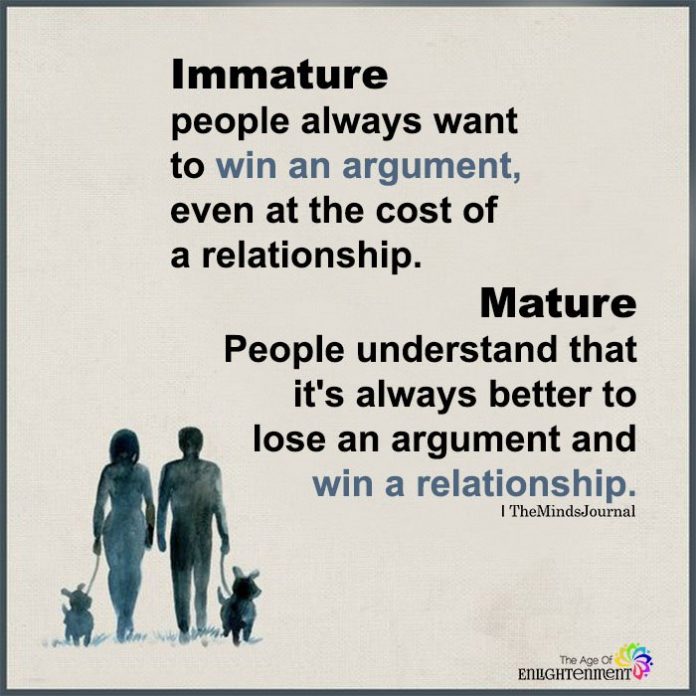
Maturity in a relationship: When intimate relationships work well, both partners…
- See the big picture for the need to be responsible and mature.
- Step up and support each other to make difficult decisions.
- Support, and accept each other’s support, to avoid letting their emotions get the best of them and do regrettable things.
But what if your intimate partner acts like a child?
Many people yearn for a satisfying relationship. Yet there are those, once in a relationship, who act immature, demanding, and overly dependent. Examples of this include:
- Partying in excess, being reckless with money, or having adult temper tantrums make them look unattractive.
- Keeping significant secrets (We know that secrets can fester and really hurt us).
- Being more focused on short-term fun to the extent that it compromises long-term goals.
- Refusing to step up and pull their weight.
Related: 6 Differences Between A Mature Relationship and An Immature Relationship
How to Deal With an Immature Partner
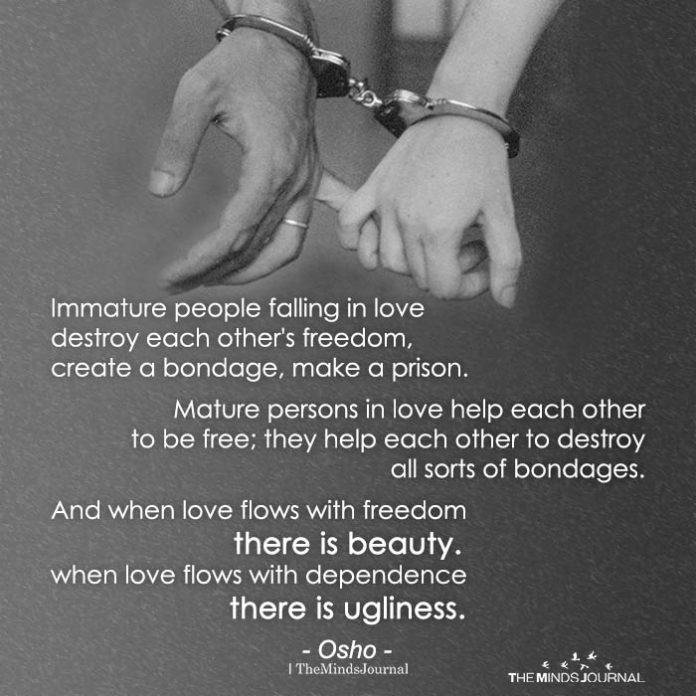
1. As obvious as this may sound, request to your partner that they stop acting like a child. Many people are hesitant to “rock the boat” and fail to “keep it real” and assert themselves to their partner acting out. This is usually because they are more afraid of being alone than staying in a relationship with a partner who is acting like a child.
2. This next suggestion is often hard for partners who are wired to take on way too much responsibility in the relationship. Stop being the parent. Many adult partners act out as children or teenagers because they are enabled by the other partner who is willing to overextend themselves. The partner who acts out gets to not face any real consequences.
So, for example, an active substance user refuses to acknowledge and work on their problem, a compulsive spender gets to keep on over-consuming, a liar gets to keep not being honest, or a partner with unrealistic earning expectations continues to feel they should only take a job with an unrealistic starting salary. These “child partners” are enabled to shirk responsibilities without fearing what everyone else fears: homelessness, loneliness, and sustained effort required in the daily grind of life.
In these situations, the enabling partner will often say to me, “But if I don’t take care of everything, who will?” My response usually consists of this follow-up question: “Is being in the role of your partner’s parent really sustainable for your emotional health?” The bottom line here is that in the same way the partner who is acting like a child needs to stop acting like a child, the one who is acting as a parent needs to stop acting like a parent.
3. Know your value. If you value yourself, you will value a partner who acts like an adult versus carrying on like a child.
It’s much easier to manage life with someone who works with you versus against you. The last thing you need is someone–who happens to be your partner–unhealthily demanding too much from you. Yes, if your partner loses their job, support them with the understanding that your partner steps up and looks for a job.
If your partner is a recovering addict, encourage and support them but don’t allow yourself to be gaslighted by a practicing addict swimming in that big river called Denial. If your partner needs to better learn financial responsibility, collaboratively guide them.
Related: 8 Immature Dating Habits Grown Men Need to Leave Behind
However, if you feel you are in a relationship with someone who is persistently acting like a child, consider seeing a qualified relationship therapist. Your partner will likely go because most kids know what will happen if they do not obey their parents. And, even if they won’t go, you should go because you need to be the responsible adult–who is seeing all the realistic future options in fairness to yourself. (My previous post may also be helpful.)
It’s one thing to accept the differences of your partner and another thing to not connect with your significant other. So, if you have a partner who behaves like a child, take these advices into consideration and let us know your thoughts in the comments below.
References
Bernstein, J. 2003, Why Can’t You Read My Mind? Overcoming the 9 Toxic Thought Patterns that Get in the Way of a Loving Relationship Paperback, Perseus Books, New York, NY.
Written by: Jeffrey Bernstein Ph.D. Originally appeared on: Psychology Today Republished with permission
Frequently Asked Question (FAQs)
How do you deal with an emotionally immature partner?
Start with a straightforward conversation with your partner. Learn to create healthy boundaries in your relationship and quit picking up the slack when they make terrible decisions.
What do you do when your partner acts like a child?
If your intimate partner acts like a child, have a conversation with them about it. The next suggestion would be understanding the reason behind their behavior. Lastly, if this persists, seek professional help or guidance.


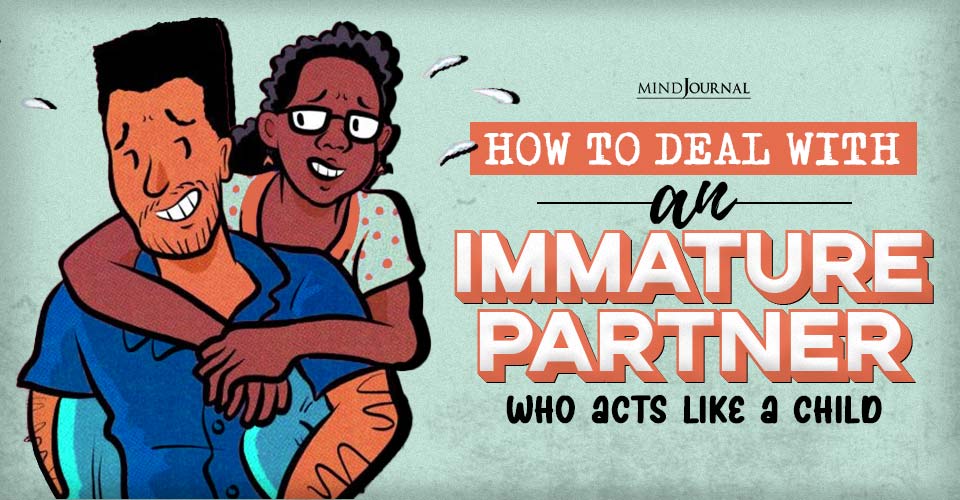




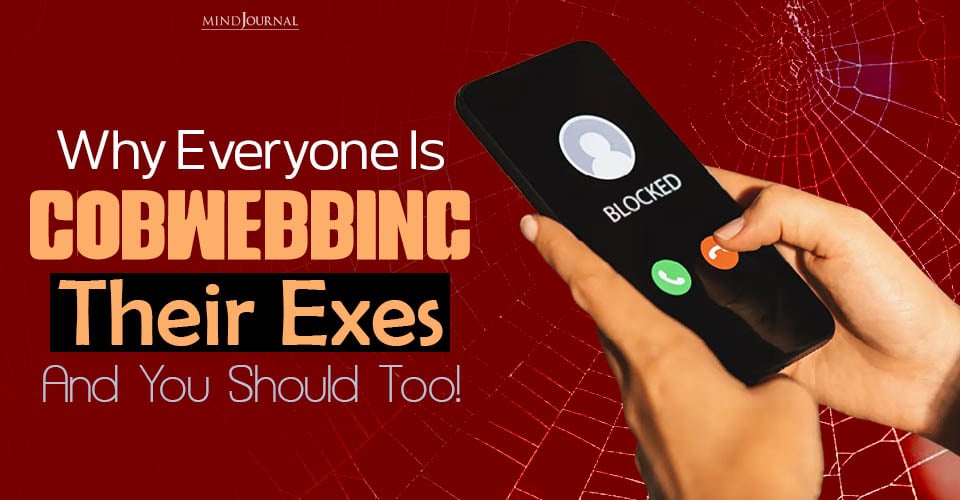
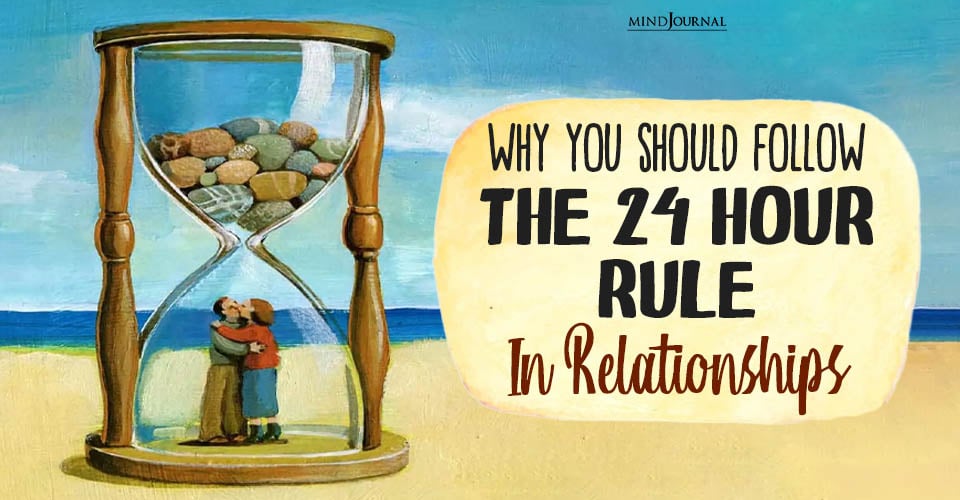

Leave a Reply